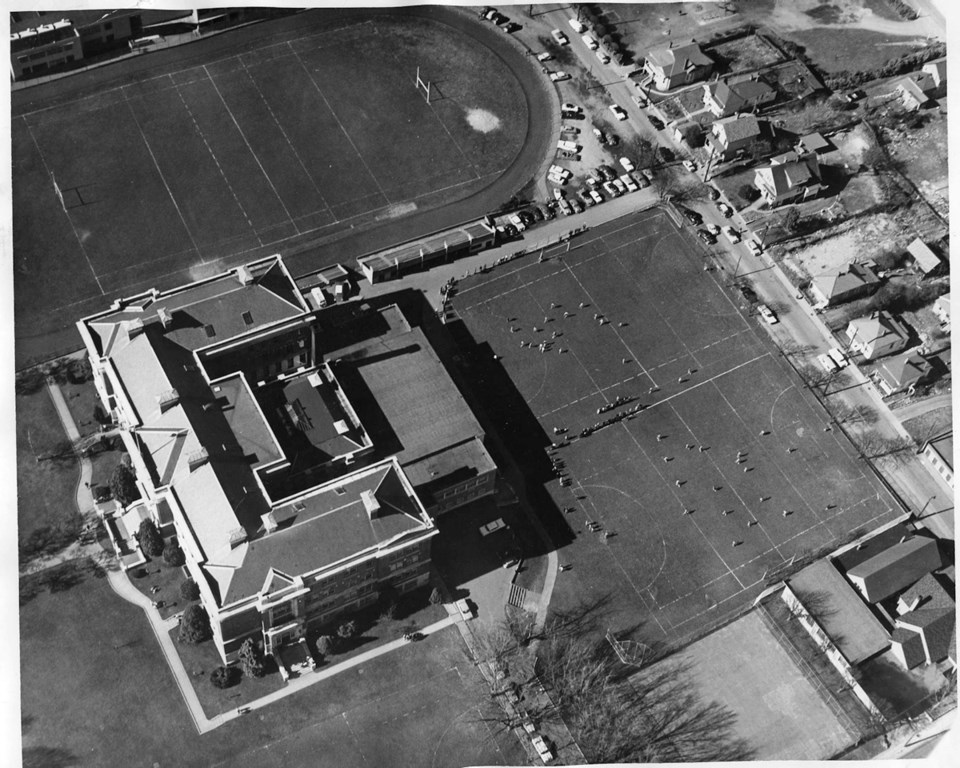Barry Gough is putting the finishing touches on his 19th book, one in which he combines two loves. The prolific Victoria writer, well-known for his passion for and knowledge of Canadian military history, is also one the biggest supporters of Victoria High School, where he was both a student and a teacher. He is currently the chairman of the Victoria High School Alumni Association.
Local publisher Heritage House is set to launch Gough’s latest work, From Classroom to Battlefield, Victoria High School and the First World War, in November.
The seven-chapter book is expected to have 224 pages and will commemorate the 100th anniversaries of the war, to be officially marked on Aug. 4, and 138-year-old Vic High’s current (fourth) building on Grant Street, which will be celebrated on the Victoria Day weekend in May.
“It’s been exciting, learning about the lives of people,” Gough said about his research on the Vic High students who died while serving ÎÚŃ»´«Ă˝.
In all, about 500 students who attended Vic High joined the Canadian Expeditionary Force during the war. Eighty-five died during the conflict.
When Gough was a student in the 1950s, he noticed small portraits of the fallen in military uniforms (since removed to museums) in the hallway. His interest in military history was piqued.
One of Vic High’s many tributes to those who served in both world wars is a brass plaque Gough saw in the main hallway designed by former student and long-time teacher (1916-1945) Earl Clarke. The plaque, which remains in the hallway, commemorates the 85 who died during the First World War, some of whom Clarke taught.
When Gough saw the plaque again in 2004, he said it shed a new light on his thinking about the men and women who lost their lives while fighting for their country.
“It seemed to me it was a story that needed to be told.”
Gough also taught at Western Washington University, Wilfred Laurier University. He was an adjunct professor of war studies and history at the Royal Military College of ÎÚŃ»´«Ă˝ in Kingston, and is a Fellow of the the Royal Historical Society. He writes the story of a number of names from the list of 85. However, he also includes the tales of a few who survived and made great contributions to the community and country following their return.
He enlisted the help of six Victorians to serve as an advisory committee to oversee the project.
The list includes former Vic High student Leona Taylor, member of the Old Cemeteries Society and expert on family stories, Vic High archivist Debbie Blackie, researcher and advisory editor Yvonne Van Ruskenveld, noted war historian Tim Travers, ÎÚŃ»´«Ă˝ provincial archivist Gary Mitchell and Keith McCallion, former Vic High principal and passionate history teacher.
One of Gough’s stories is about Major John Gibson Anderson, who rose from the rank of private and was awarded the Military Cross for his heroic battles. Anderson was known for his expertise in raiding enemy trenches and he called himself “Lucky Star” because he and a fellow officer survived several battles in 1915. He died in 1917 at the Battle of Passchendaele near the Belgian city of Ypres.
Anderson was a good boxer and an even better wrestler. He was a Canadian universities wrestling champion before heading off to war.
Another story is that of Henry Forbes Angus, who was born in Victoria, earned a degree at McGill University in Montreal, was recommended to attend Oxford University and won the coveted Vinerian Prize for academics at the prestigious British school.
He became a University of British Columbia professor, a famous economist and distinguished civil servant. Angus survived the Great War and died at the age of 101.
Gough, 75, tells the story of English-born Rhodes Scholar Arthur Yates, who came to Victoria in 1911. Yates was a rugby coach at Vic High until late 1916. After the war, he became the leading advocate for rugby in the United States and is still highly regarded in U.S rugby circles.
One of the more touching stories is that of Jessie Nelson King, Vic High’s top student in 1906, who enlisted as a nurse in the Canadian Medical Corps. Her brother was killed in the war and she made it a mission to find her brother’s grave, a difficult task in those days. She succeeded, but was wounded by an explosion in the hospital where she was stationed and was the last Canadian military nurse to die in the Great War.
“Most readers wouldn’t have a clue about the First World War,” Gough said. “This is the first generation of Victorians to suffer loss in such a catastrophic way. It is the nature of war.”



